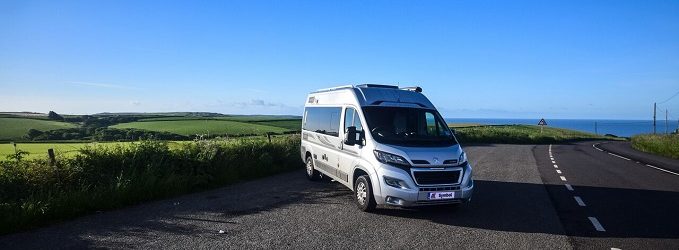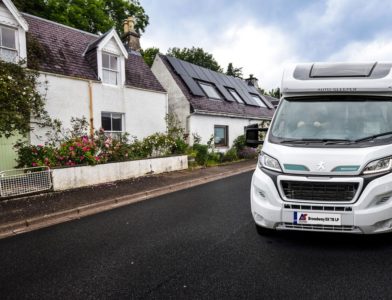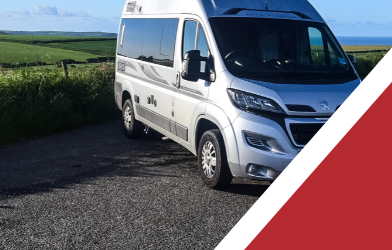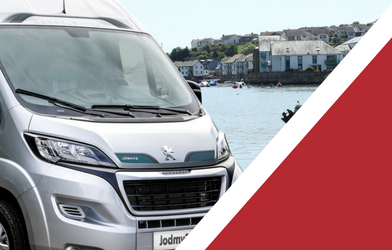Looking for and buying a new motorhome is exciting. It can be great fun and just looking at the models on offer can really whet your appetite.
You’ll be spending a significant amount of money. Understandably, you’ll want to avoid making any errors in deciding eventually what motorhome to purchase. Of course, it is entirely up to you what motorhome you eventually choose to buy – it isn’t up to us or anybody else to tell you what is the most suitable motorhome for you.
But we do believe that it’s our primary duty is to offer you objective advice and guidance as you go through the process of selecting a motorhome. So, here are a few motorhome buying tips to help you get started. They’re based on the assumption that you’re new to motorhomes rather than a seasoned veteran of many such purchases and also that we’re discussing new rather than pre-used vehicles.
Preparatory work
Signing the bottom line for the purchase of a new motorhome is not difficult.
What’s important is the preparatory work before getting your pen out. Here we examine some of the key points, including one or two that are sometimes overlooked in the excitement of such a large purchase.
Research
Sometimes reviews of makes and models of motorhome can be difficult to interpret if you’re unfamiliar with the appropriate terminology. The same can even apply to some of the more technical motorhome buying tips.
Take some time, therefore, to thoroughly research and read-up on motorhomes, their main components and the sometimes specific language used to describe them.
No manufacturer or dealership is likely to publish negative reviews on their website about their services or a vehicle they’ve sold. Thankfully, there are plenty of unbiased and objective review sites online. Use them to check out what real buyers have thought of the vehicle you’re considering and, if possible, the post-sales service standards of the dealership.
Once you’re up to speed, look at those reviews of given models to check things such as:
- reliability;
- comfort;
- driving ease;
- running costs;
- power/performance (this isn’t about speed, it’s about how easily the model will cope with hazards such as steep hills when fully loaded);
- the flexibility of configuration (your requirements may change between one trip and another).
Take advice
There are specialist and generalist motorhome dealers.
The difference is usually visible in terms of whether they have the odd motorhome for sale amongst lots of other vehicle types or are clearly dedicated to motorhomes as a business. Typically, the specialists will be able to offer more focused and broader-based advice than a generalist might be able to.
Think carefully about your needs and requirements
Think about your recreation plans in general. It goes without saying that they are almost certain to be based around mobile holiday concepts and the great outdoors. However, you’ll need to think about:
- whether this just you and your partner primarily or whether you intend to invite others (e.g. children, grandchildren, relatives, friends) to join you? That makes a big potential difference in terms of the size and configuration of the motorhome you might select;
- your destinations. Even if you won’t ever have others with you, if you plan to use your vehicle regularly and over very long distances say around Europe, having a larger and more spacious vehicle might make more sense than opting for a smaller one; and
- do you prefer preparing food yourself or do you see that as a chore to be avoided in favour of restaurants when on holiday? If the former, you might choose a motorhome with a top-of-the-line specification kitchen.
Here are some of the additional questions you might want to ask yourself before firming up any decisions:
- just how often and over what sort of distances and durations, you think you might want to use your motorhome;
- how your requirements sit with regards to the distribution of space between the driving cab and lounge areas;
- how many berths you will require on a typical use basis;
- your views about the running costs of the various models;
- whether or not you are comfortable driving larger as opposed to intermediate or smaller motorhomes;
- the level of equipment you need. Some motorhome owners like to have the ultimate in comfort and equipment whereas others prefer a slightly more camping-type experience with more modest equipment levels;
- how much you would normally like to take with you, in terms of clothes and other possessions, when you are setting off on a trip. If that might seem a strange question, it is, of course, related to balancing things such as additional berths versus larger storage units in the motorhome; and
- your preference for the driving experience. The engines in motorhomes and the driving seat/instrument configurations can vary significantly from one chassis to another. Some may suit you well, others perhaps less so.
The above list is far from comprehensive but it’s illustrative of how we like to get to know our potential customers so we can play a productive part in helping them to make the right choice.
Clarify your finances in advance
One of the major additional considerations is your budget.
A significant number of motorhomes are purchased outright using cash. You might have been fortunate enough to pick up a lump sum through something such as an inheritance, a pension lump sum, an unexpected windfall and so on.
However, you may wish to think carefully before spending your disposable cash in this fashion. Once converted into a motorhome, remember that your money will start to depreciate, and you also may not be able to access it quickly or cost-effectively if you need it for an emergency.
So, invest some time in planning your motorhome finance before starting to look at those vehicles and their purchase deals.
It’s often advisable to think more roundly about your finances and to look at a number of options including motorhome finance provided by a specialist. Having, for example, a hire purchase agreement in principle in your pocket might strengthen your negotiating position with dealerships.
If you plan to buy your motorhome with the help of finance (which we can help you with), how much you will be able to comfortably afford each month by way of repayments. That will also highlight the importance of your credit rating.
Typically, questions about financing your purchase fall into two broad categories:
- understand what you can afford in terms of purchasing cost and if you’re opting for motorhome finance, how much you can comfortably repay each month; and
- do your sums on the annual running costs of any particular vehicle you may be interested in buying. Make sure your budget includes the cost of trips in your motorhome – you’ll want to get the maximum use out of your new vehicle.
Check the depreciation
Different models may have significantly different depreciation curves. That is essentially showing how much their value from new will reduce over the years ahead.
The good news is that, typically, new motorhomes tend to hold their values well when compared to most standard motor cars. Even so, there may be variations in that depending upon the make and model you select, so this is something that is useful to know in advance.
Don’t underestimate extra comfort
It’s often worth spending what might be relatively modest extra sums to provide you with a few optional extras or even a model upgrade if it helps make the motorhome feel more like a true home-from-home.
Don’t over or underestimate your required space
There is an entire science behind estimating just how much space you will be comfortable within your motor home. The answer, of course, it varies from one buyer to another.
There are many guides that are worth consulting to try and make sure you don’t end up with a vehicle that is too small for your comfort or so large that you don’t feel easy about driving it.
Inspect, view and test drive the model of motorhome you’re interested in
It can be risky to base such a large purchasing decision on an inspection of a model a dealership tells you is “fairly close” to the one you have in mind. After your own house, of course, a motorhome is likely to be the second most expensive purchase you will ever make.
You wouldn’t normally decide to purchase a property unseen based on a viewing of one that was vaguely similar many miles away, so don’t be tempted to do the same where a motorhome is concerned.
Consider a basic familiarisation course
If you’re unused to driving a motorhome, it can be slightly intimidating initially. For example, even with modern all angle cameras in the cab, reversing can be an acquired art.
Many dealerships will be able to recommend a quick overview, familiarisation and manoeuvring course – such as those offered by both the Caravan and Motorhome Club and the Camping and Caravanning Club. It might be an idea to take one in advance of deciding on a specific purchase, as it might even influence your final choice of vehicle.
Summary
The most important of all motorhome buying tips is – take your time and avoid rushing. Getting a good fit for your situation, needs and requirements is imperative.
At Derby Motorhomes we can help you with your decision so that you find the right motorhome for you. Call us today on 01332 360222 to see how we can help!




